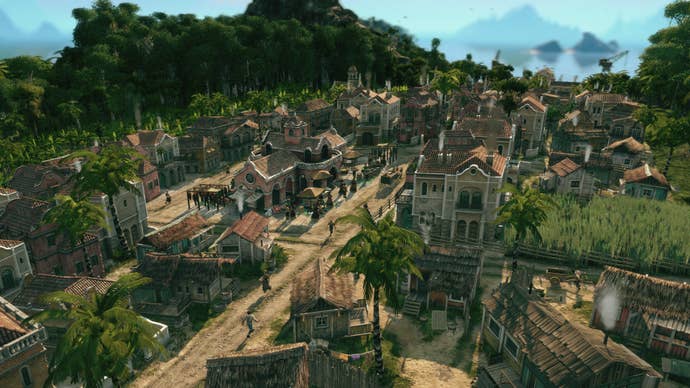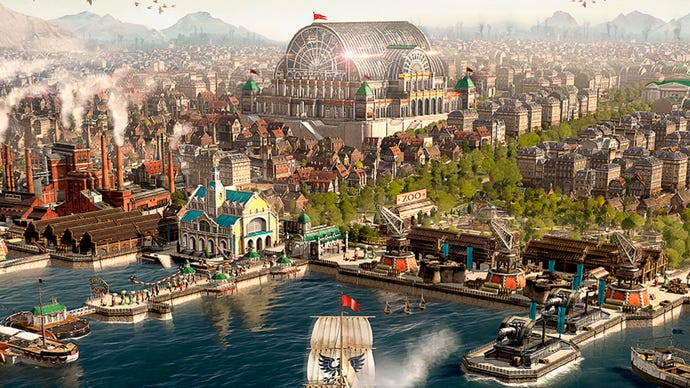Anno 1800 Review
Gotta get back in time.
This article first appeared on USgamer, a partner publication of VG247. Some content, such as this article, has been migrated to VG247 for posterity after USgamer's closure - but it has not been edited or further vetted by the VG247 team.
While most are generally preoccupied with the Civilizations and Cities: Skylines, Ubisoft's Anno series has chugged along in the background. I didn't personally touch the series until 2009's Anno 1404, the fourth game in the franchise. I'm bad with history overall, I don't think I've ever gotten above a C in a history class. If it wasn't for Assassin's Creed, I'd probably miss events of historical significance altogether. So, it was with some trepidation that I took a step back in history with the latest release, Anno 1800. Would Blue Byte be able to sell me on its return to the past?
Anno is one of the more straightforward city builders, making it easier for new players to get into. You don't have to worry about traffic, like Cities: Skylines, nor do you have to account for specific citizens and their travels, like you do in Tropico 6. Instead, it's simply about having the right buildings to house your workers and keep them happy, and then scaling those operations up.
Everything in Anno 1800 plugs together in a seamless way. To keep Farmers happy, you need schnapps, and you get schnapps by building a potato farm, and then a distillery to turn those potatoes into alcohol. And all those spots along the supply chain need farmers keeping the whole line moving. Anno 1800 is about growing your population to provide warm bodies to make stuff, and to keep that population happy. It's more plug-and-play than some city builders, which prize layout planning above everything else. In contrast, Anno 1800 makes it very easy to move buildings around as you grow. In fact, the general layout of Anno 1800 makes for an easier city-builder overall, and probably something that's well-suited to neophyte players.
As you improve your city, you'll jump up through different supply ecosystems of basic and luxury needs: Farmers and their buildings need things like timber, fish, clothes, and alcohol to grow, while the subsequent Worker tier adds bricks, steel, sausages, and other items to the list. Basically, the needs of your people balloon outward as you rise through the ranks, requiring more of an agrarian and urban sprawl to keep them happy. There's five tiers within the islands of the Old World: Farmers, Workers, Artisans, Engineers, and Investors.
There's also the New World, a series of colonies tied to your opening islands, but with their own tiers of workers and goods. This feels like a slimmed down version of the alternate map types in Anno 2205. There, you had the Temperate, Arctic, and Lunar environments that were roughly connected, while here it's just the Old and New Worlds that you can trade between to share resources. Take Rum, a wonderful luxury that requires sugar cane, which only grows in the New World. You have to balance both sides to truly keep your people happy. I do wish there was more variety to environments like Anno 2205, where the three types felt vastly different overall.
To gain all of the resources needed to reach the final tiers of production, you'll need to expand your empire. Resources are only available on some islands, partially because of a random drop like a mining deposit, and partially because the soil fertility. You can colonize other islands to get those resources yourself, but Anno 1800 also features a robust system of trade routes and takeovers. You can trade with other groups for their resources, buy shares to financially control them, or resort to military force to take their ports for your own needs. The latter is a pretty small part of Anno 1800 overall though, there is combat strategy, but it's not the focus here. In fact, it feels a bit tacked on overall; instead of being a core pillar of Anno 1800, warfare here lacks strategic elements like formations and flanking. There's no real tactics to it, outside of throwing your stronger ships at weaker enemy ships.
Anno 1800 also has a full four-chapter campaign mode, which sees the player as the true heir to the Goode and Sons trading company. With the death of your father, who was branded a traitor, you villainous uncle Edvard has taken over the city of Bright Sands. It's up to you, to establish a new town and prosper enough to put Edvard in his place. The campaign itself is a lengthy tutorial for Anno 1800, and actually opens up into the game's sandbox mode when you're finished.

All of this looks fantastic, too. Anno 2205 was a goddamn looker in terms of visuals, and Anno 1800 is no different. Zooming in on your city, you can see the purely cosmetic workers going about their business. They cut down timber, drink at pubs, and buy things at the marketplace. It feels like a living diorama of life in this era, and Anno 1800 only gets more impressive as you move through the tiers of progress. This aesthetic strength does come with a performance hit though, so expect frame rate dips in some of your bigger cities.
There are small facets of the campaign tutorial that aren't really explained to new players. Once, I received a drill from a citizen for a quest, but I couldn't figure out how to take the item from him. Or there's colonization, which is a key feature of the mid-game, but took some hammering on my part to figure out. And many of the stronger trade mechanics are simply not explained at all. The campaign also doesn't cover the Engineer and Investor tiers, I assume because Blue Byte believes you're prepared enough to handle those on your own.
I also ran into some aspects that either made no sense, or trivialize some of the play overall. For example, keeping your population high is a must in order to grow, but you don't necessarily need to keep all of those workers employed. (In fact, you want to keep a surplus of unemployed workers ready to build ships.) You'll generally run out of money if you try to rely purely on production and trade, but you'll be swimming in gold as long as you're producing ships and selling them to other companies. I think there needs to be a little tweaking to shift that balance a bit.

Speaking of money, the user interface of Anno isn't properly built to give you a detailed picture of your cash and production flow. It's not always easy to know that you're missing clay for brick production, or that the lines of supply are stopped because you need another storage facility. And trade lines with other islands will sometimes sit dead for awhile, because you're not quite sure what happened to the supply in either direction. Money will be coming in, and then boom, it's stopped. For a city-builder predicated around the economy, this side of Anno 1800 needed to be better.
With Anno 1800, Blue Byte did do enough to overcome my general disinterest in some of the more historical settings of the franchise. There are enough improvements that I was still playing the game deep into the night. And unlike Anno 2205, there is downloadable content and multiplayer to provide some longevity to the experience. But there are a few design decisions, unexplained mechanics, and missing user interface elements that pull Anno 1800 back from top-of-the-line greatness. It's a great city-builder, but maybe we'll be waiting until the next entry, or one of the DLC releases, for it to be a perfect one.
ConclusionAnno 1800 is a city-builder that caters to new players. It's gorgeous, has a campaign that's a huge tutorial, and players don't have to worry about sim aspects like traffic and power distribution. While there have been improvements to the Anno formula, some mechanics are simply not explained and the user interface is lacking for a game built so heavily around trade and economics. It's a good game for sure, but it needs some tweaks to make it fantastic.

